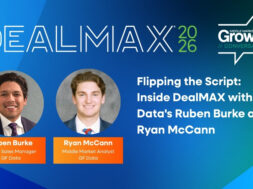Dealmakers Eye a Rebound: ACG Chicago Panelists Discuss M&A Outlook and Talent Trends
Insights from ACG Chicago’s Midwest Capital Connection

The 2026 M&A market outlook and talent strategies were hot topics last month at ACG Chicago’s Midwest Capital Connection, which featured high-impact networking, one-on-one meetings, and expert-led panels.
Around 800 middle-market dealmakers attended the conference on Oct. 29–30 at the Hilton Chicago, including representatives from over 100 investment banks. Having scheduled nearly 4,000 meetings using the ACG Access scheduling software, attendees spread out across the conference space for conversations about ongoing deals, new business opportunities, and updates on their firms.
In between meetings, attendees heard directly from dealmakers and business leaders during three panel discussions. The sessions covered dealmakers’ front-line observations of the current M&A environment and their predictions for the year ahead, along with talent strategies to stay competitive in the current climate.
Event Recap
WHAT: ACG Chicago’s Midwest Capital Connection
WHEN: Oct. 29-30, 2025
WHERE: The Hilton, Chicago, IL
THE TAKEAWAY: Event panelists shared their outlook for M&A in the year ahead, plus offered tips for retaining talent and staying competitive.
Dealmaker Download
The Dealmakers Roundtable session discussed prevailing trends in today’s M&A market and what’s ahead for 2026.
One topic was the extended hold periods of private equity platforms and the widespread pursuit of add-ons to bolster their value before exit. Not all PE firms have executed this strategy successfully, however, having acquired assets with insufficient regard to how they fit together. One private equity panelist warned that achieving multiple expansion through add-ons—acquiring smaller businesses for low multiples, then selling the enhanced platform for a higher valuation multiple than you paid—doesn’t work unless you “truly integrate” the add-ons into the parent company.
The exit climate has been further stymied by inflated offers at the outset of a process. Sellers increasingly are being “left at the altar” after receiving high bids initially, only to see a sharp reduction in the offer during due diligence. That’s created frustration among more serious bidders that are priced out and eliminated from processes early.
A tailwind for future M&A that panelists cited is the shrinking valuation gap between buyers and sellers. Buyers have become “more amenable to structure,” one panelist said, evidenced by greater use of rollover equity, seller notes, and earnouts. “Founders have realized that investing alongside private equity is a pretty good bet,” according to one speaker.
Another panelist predicted that 2026 will see more deal flow overall. They also expect to see a compression of returns and MOICs (multiple on invested capital) as PE firms feel pressure to exit portfolio companies in order to raise their next fund.
Industries where panelists expect to see high volumes of M&A in the year ahead include aerospace and defense, commercial and facility services, residential services, professional services, infrastructure services, and healthcare consumables.
Talent in the AI Era
A common theme across the conference’s two talent-focused panels was the impact of artificial intelligence on the middle-market workforce.
During a session about competitive talent strategies, panelists agreed that AI will play a greater role in the hiring process—by helping to more quickly evaluate resumes, and highlighting the strengths and weaknesses of a candidate, for example. However, they stressed the continued role of human judgment in choosing whom to hire. “I think decision-making is still best outside of technology,” said one panelist.
Another speaker predicted a pivot to in-person interviews over virtual conversations as candidates grow savvier in using AI themselves. Applicants are increasingly using AI models to interpret interview questions in real time on a second screen and parroting AI-generated responses, the panelist noted.
Another risk relates to CVs, as some applicants exaggerate their qualifications with key words inserted in white text on their resume. Invisible to the human eye, the keywords can trigger the AI to elevate the resume, potentially giving an unfair advantage to the candidate over more qualified peers.
Focus on Fundamentals
During a session focused on generational differences within organizations, panelists shared ways that middle-market companies can engage and retain talent across age groups.
They noted that middle-market companies ought to focus on fundamentals, like aligning their workforce with the company’s purpose and values, and creating job descriptions, scorecards, and feedback mechanisms. “Every generation wants those basics,” a panelist noted.
At the same time, companies should avoid overengineering or overcomplicating those elements in favor of solutions that are tailored to the business’s size and complexity.
“Get the fundamentals right, keep things simple, and make it stage-appropriate,” the panelist recommended.
Next year’s Midwest Capital Connection will be held at Chicago’s Navy Pier on Oct. 7–8, 2026.
Katie Maloney is ACG’s Vice President, Communications & Content.
Middle Market Growth is produced by the Association for Corporate Growth. To learn more about the organization and how to become a member, visit acg.org.


